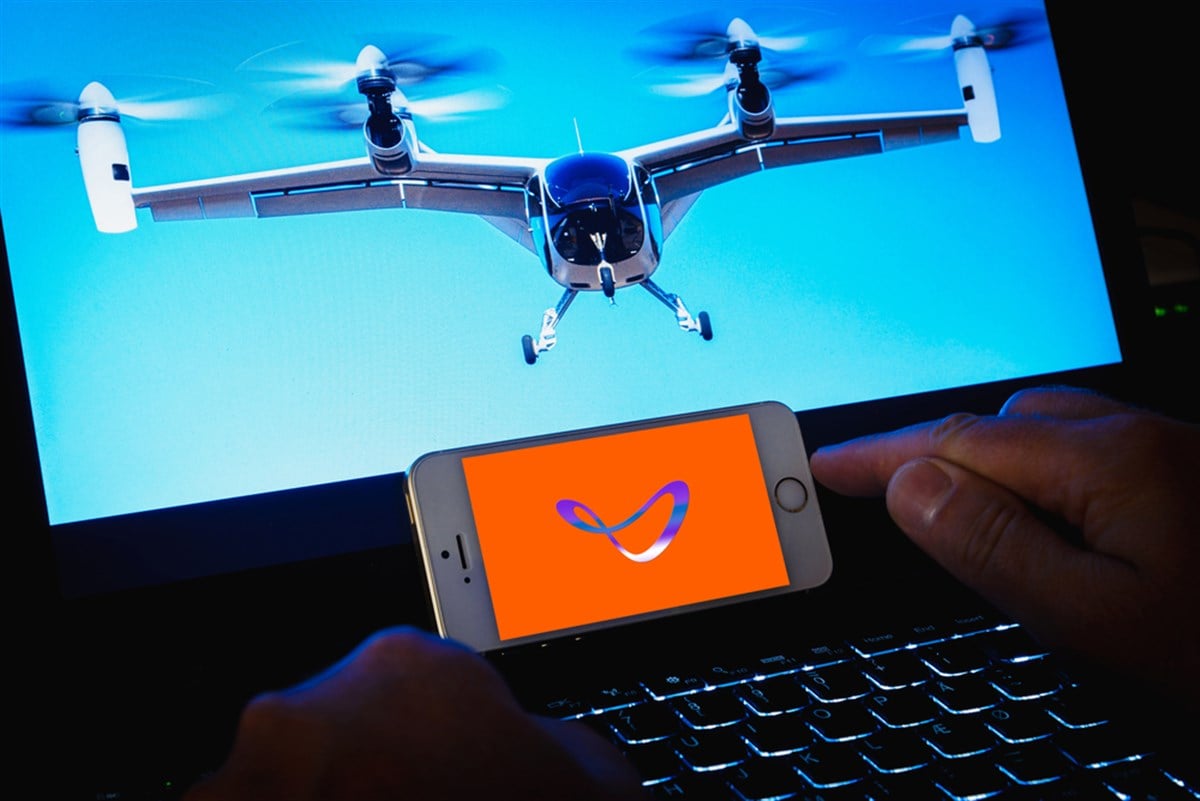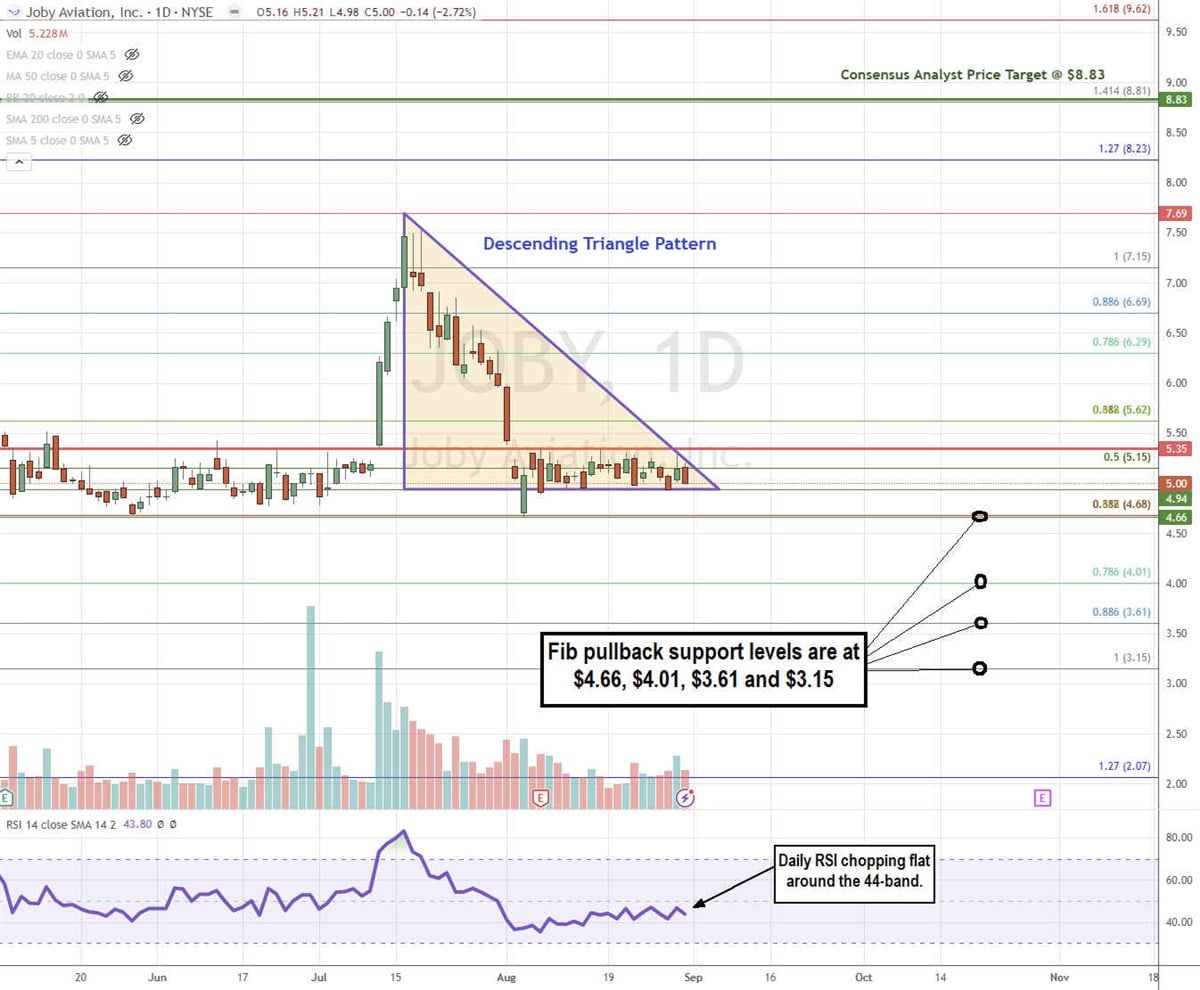
Joby Aviation Inc. (NYSE: JOBY) designs and manufactures electric vertical take-off and landing (eVTOL) aircraft called air taxis. Joby wants to make air taxis accessible to consumers for fast, sustainable, and quiet flights. Joby wants to help commuters get over and above city traffic, bypassing congestion and bottlenecks at speeds that are 5x to 10x faster than driving, replacing a 45-minute drive with a seven-minute air taxi ride. Joby has a first-mover advantage in the United States, and it plans to have an operational air taxi network launch in 2025, operating initially in New York, Los Angeles, and Dubai, pending FAA certification.
Joby Aviation operates in the aerospace sector, competing with eVTOL makers Archer Aviation Inc. (NYSE: ACHR), Lilium N.V. (NASDAQ: LILM), and EHang Holdings Ltd. (NASDAQ: EH).
First-Mover Advantage
Joby has been working on its air taxi since 2009, with its first full-scale demonstration in 2017. Joby’s S4 eVTOL aircraft can carry a pilot and four passengers at speeds topping out at 200 miles per hour. The company plans to generate revenues from manufacturing and selling eVTOLs and operating its air taxi networks with its partners. The company still needs additional compliance certifications, including its pilot training program; Joby has completed more flying miles (33,000 miles in four years) and trained more pilots so far than any other U.S. eVTOL company as it attempts to be the first entrant into the electric air taxi market. The company will have four production prototype aircraft flying before year's end. By the end of 2025, Joby plans to have 25 aircraft flying between three locations.
Regulatory Certifications
The company received Federal Aviation Administration (FAA) authorization for its ElevateOS air taxi operating system. Joby has already received its FAA Part 145 Repair Station certification, which enables it to perform select maintenance repairs on aircraft. Joby was the first eVTOL to receive Air Force air worthiness approval. It received 135 certifications in 2022, enabling it to operate as an air taxi service. It completed its pre-production prototype flight test program and is progressing toward its extensive flight testing. Joby received 100% compliance and certification with Stage 3 of the five-stage FAA approval process. The company has completed 37% of Stage 4.
The five stages are comprised of:
- Stage 1: Certification Basis is 100% complete by Joby and the FAA.
- Stage 2: Means of Compliance is 97% completed by Joby and the FAA.
- Stage 3: Certification Plans are 100% complete by Joby and the FAA.
- Stage 4: Testing and Analysis is 37% complete by Joby and 14% complete by the FAA
- Stage 5: Show and Verify is 2% complete by Joby and 0% by the FAA.
Joby also applied for certification in Australia, which will be approved upon FAA approval.
ElevateOS: Developing the Air Taxi Software Infrastructure
This is a suite of software tools similar to the Uber Technologies Inc. (NYSE: UBER) rideshare app, including pilot and consumer-facing rider apps. Joby acquired Uber Elevate in 2020 to integrate with its operations in 2025, making Uber a partner. The Elevate team was instrumental in developing the ElevateOS airline operating system software stack. ElevateOS is integrated with Uber and Delta Air Lines Inc. (NYSE: DAL) to enable riders to book the entire journey, from taking an Uber or air taxi to the airport to booking flights on Delta to catching an Uber ride or air taxi out of the destination airport. The intelligent matching engine connects the rider to pilots, aircraft, and vertiports to destinations.
Value Proposition and Partnerships
Joby underscores that the two core value propositions for its air taxis are reduced maintenance costs and greater aircraft availability once they get into commercial production. The company has partnered with Delta Air Lines Inc. for its New York and Los Angeles air taxi networks. Delta made an initial $60 million investment, with potential up to $200 million. Joby plans to have 300 aircraft in Los Angeles and ramp up to 14,000 in seven years.
Its rideshare air taxi mobile app operates like the Uber app but only for air taxis. According to Tech Crunch, Joby has secured a deal with Virgin Atlantic, which is 50% owned by Delta.
It also closed a six-year deal to operate air taxis in Dubai, with its first vertiport expected in 2024 and in-region flight testing in 2025. Like Archer Aviation, Joby is also working with the Department of Defense. Validation is underway in the U.K. and Japan. Joby has $825 million in cash.
Toyota is Joby’s Largest Investor and Partner
Toyota Motor Co. (NYSE: TM) is Joby's partner and largest external investor, having invested $400 million. Joby signed a long-term supply agreement for powertrain and actuation components. Toyota will manufacture and deliver the Joby-designed components to its powertrain and electronics manufacturing facility in San Carlos, California. For integration, the finished assemblies will be shipped to its pilot production line in Marina, California. Toyota also helps design Joby's Marina facilities.
Next-Gen: Hydrogen-Electric Air Taxis for Regional Flights
While electricity is ideal for air taxi networks operating in suburbs and cities, hydrogen is ideal for longer-distance regional flights. A hydrogen system can reduce the weight of the batteries on board to add a hydrogen fuel tank constructed by Joby. This tank can store up to 40 kilograms of liquid hydrogen. The hydrogen is converted into gas to feel the fuel cell system.
Joby completed a 523-mile emission-free flight demonstration in Marina, California, setting a world record with one of its prototypes that has already flown 25,000 electric miles. This will enable Joby to fly from city center to city center, from Boston to New York City, Washington DC, Detroit to Nashville, and so forth. The research is still in the early stages but paves the way for potential regional flights.
JOBY Stock is in a Descending Triangle Pattern
A descending triangle pattern consists of a flat-bottom lower trendline support and a descending upper trendline resistance connecting at the apex. As shares approach the apex point, a breakout through the upper trendline or a breakdown through the lower trendline support is imminent.

JOBY commenced its descending trendline off the $7.69 swing high towards the $4.94 flat-bottom lower trendline support. Shares have been chopping sideways between the $5.35 gap fill and the lower trendline since the beginning of August 2024. The daily relative strength index (RSI) is chopping sideways around the 44-band. Fibonacci (fib) pullback support levels are at $4.66, $4.01, $3.61 and $3.15.
Joby Aviation’s average consensus price target is $8.83, and its highest analyst price target sits at $10.50.
Actionable Options Strategies
JOBY is a high-risk speculative stock that should only be considered for seasoned speculators. The company has no revenues yet, and any number of certification issues could delay the launch of its commercialization. Speculators may consider pullbacks near fib support levels using cash-secured puts. A wheel strategy can be implemented upon being assigned shares and writing covered calls to generate income and buffer downside risk.














